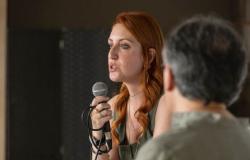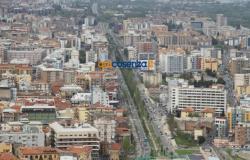«I started with a degree in biotechnology at the University of Teramo and from there I continued elsewhere, first in Rome, then in New Jersey and now in Miami:…
Already a subscriber? Log in here!
SPECIAL OFFER
BEST OFFER
ANNUAL
€79.99
€19
For 1 year
CHOOSE NOW
MONTHLY
€6.99
€1 PER MONTH
For 6 months
CHOOSE NOW
SPECIAL OFFER
SPECIAL OFFER
MONTHLY
€6.99
€1 PER MONTH
For 6 months
CHOOSE NOW
Then only €49.99 instead of €79.99/year
Subscribe with Google
«I started with a degree in biotechnology at the University of Teramo and from there I continued elsewhere, first in Rome, then in New Jersey and now in Miami: I suggest the kids from Abruzzo leave home behind them». Luca Tottone is now a prestigious researcher, awarded several times, who carries out his work at the Sylvester Comprehensive Cancer Center of the University of Miami, studying the transformations of cells in the blood: an emblem of the brain drain that grips our region. And he adds: “For those who want to leave, you can contact me on social media for useful advice on how to do it.” There is also Stefania Tarquini, daughter of the former head physician at Mazzini in Teramo Pierluigi, who “launches” satellites for Eumetsat abroad, essentially directing a structure that takes care of putting them into orbit for the detection of anthropogenic Co2: «During the Kilimanjaro broadcast – is his comment – I will briefly explain how European organizations and how the agency contribute to the monitoring of climate change through the use of satellites». Even if the nostalgia is great: «What can we do without Abruzzo – we ask – mountains, sea, fish and kebabs».
OPPORTUNITY
Despite everything, there is no shortage of examples of brain return. Vincenzo Di Nicola, in fact, after having been co-founder of GoPago, a mobile payments startup in San Francisco, has now decided to return as head of technological innovation and digital transformation at INPS. He is in Abruzzo with a mantra in his heart: «To encourage Abruzzo high school students to study scientific subjects and, in my small way, to contribute to the formation of solid foundations for the future of the country». Another returning brain is undoubtedly Alessandro Pajeskwi, home for 4 years after 20 in the USA: he now directs the Gran Sasso Science Institute (Gssi), a university high school (it is a foundation) based in L’Aquila which acts as an institute of research and advanced doctoral training also in an industrial context. From the States he regrets «the ease with which one can interface with the PA, with the tax regime and with the financing to draw on»: «I went to study biology, then I became a consultant for the Boston Consulting Group (a top global consultancy company strategic with 90 offices in 50 countries, ed.)”. But returning to his homeland it seems he didn’t make a deal from an economic point of view: “There I earned 5 times more”. «But now I represent a technology area that is hungry for talent, we need it, even for industries, because universities, although high quality, do not train some figures: the prospects here are not comparable to those that a young person can find abroad, both for opportunities and for remuneration”.
Pajeskwi gives the example of a surgeon specialized in robotics who remained precarious here while in the USA he was recognized for his economic skills “that he didn’t even dream of”. Now in L’Aquila his task is also to take back local jewels and brains in a “rewarding area”: «In addition to trying to keep our most promising young people here, we are working to bring two researchers back to us, one who works in Germany, the other in Switzerland, which deal with software and electronics».
The phenomenon of the best Abruzzo youth leaving the region to have job opportunities that they would never have here is constantly increasing: according to the CGIA of Mestre, as many as 1,439 people in Abruzzo (2024 data on 2022) have gone to make their fortune elsewhere ( 55 thousand in the whole country). Efforts on the part of parents to give their young people a better chance are difficult. Lidia, a former ASL employee now retired, knows something about it: «I had to sell a house but it was worth it because then my daughter Gisella worked at the World Bank and Oxford Analytica, now she lives in the Cotswolds, between London and Oxford and has 4 children complete with ius soli.” For some, it is more a phenomenon of the times than an escape. «A recent Linkedin study – observes Stefano Cianciotta, CEO of Fira – has shown that the process of brain migration has been reversed because more and more professionals and students from traditionally rich continents (Europe and the United States) are moving towards new rich countries, such as the Emirates, Saudi Arabia and India, but also towards economically attractive even if politically complex countries, such as Nigeria or South Africa. Talents are not on the run but on the move.”
© ALL RIGHTS RESERVED
Read the full article at
The messenger





